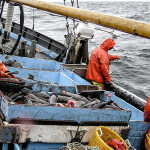Bon Appétit Management Co. has announced a new set of seafood-purchasing guidelines for its more than 1000 cafés in 34 U.S. states as part of its new Fish-to-Fork sustainable seafood program, updating its stance on antibiotics use in its aquaculture supply chain.
The USD 1.4 billion (EUR 1.2 billion) Palo Alto, California, U.S.A.-based foodservice management company, which caters to corporations, universities and specialty venues, has specifically outlined its concerns about the overuse of antibiotics within the salmon farming sector.
“We’ve looked at sustainability of wild fisheries through the lens of the Seafood Watch assessments and have been committed to serving only green-rated and yellow-rated species” Maisie Ganzler, the company’s chief strategy and brand officer, told SeafoodSource in an email. “For aquaculture, the antibiotics issue is addressed in the Seafood Watch chemical score, but not in a way that our we can zero in on just that score when making purchasing decisions, that we’re looking to make further progress on this public health threat.”
Bon Appétit has a tough standard when it comes to any antibiotics use in all of its food production supply chain, Ganzler said, going beyond most international standards, including the World Health Organization’s most recent gudlines, which recommend restricting only those drugs important in human medicine.
Although it may seem simpler, policy-wise, for the company to have declared that it will buy only proteins raised without any antibiotics by requiring the “never ever” standard that consumers are beginning to recognize, Ganzler said that approach unfairly penalizes some of the company’s smaller farmers and ranchers. Farmers want to be able to treat individual sick animals with appropriate medicines but do not always have the benefit of a secondary, “conventional” sales channel in which to sell a steer they’ve had to use antibiotics on, for example, the company said in its revised 2019 policy announcement.
Ganzler said the company has been hesitant to consider buying farmed salmon previously due to concerns about feed-conversion ratios, escapes, and sea lice, but as the industry has made improvements on those issues, it has begun to consider it.
“Several of our chefs have tried the Seafood Watch Best Choice farmed salmon, and I have heard great things about the quality and taste, but price has been a limiting factor in usage,” she said. “The door is open to discuss other farmed-salmon products in the future, if the over-dependence on antibiotics and other environmental ills are addressed – and the taste is great.”







